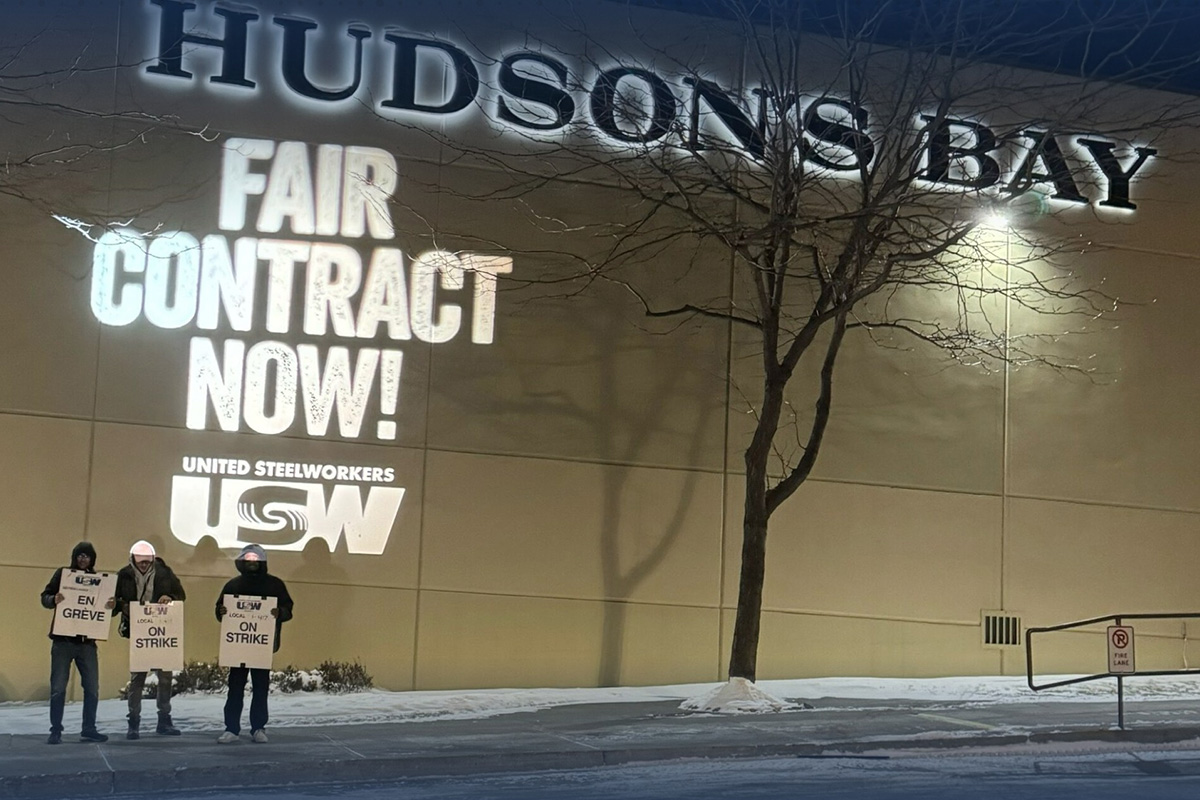
Since Dec. 10, Hudson’s Bay employees in Kamloops, British Columbia, represented by United Steelworkers Local 1-417, have been on strike in response to the company’s insulting $0.17 wage increase offer.
In 2023, a living wage in Kamloops was estimated at $20.91, marking a two dollar or roughly 10 per cent increase from the previous year. In the face of these rising costs, the company offered just one per cent per year, roughly $0.17 to start.
The disparity between this benchmark and the workers’ wages has left them with little choice but to fight.
Angie Bains, a dedicated employee at the location, highlighted that the rising cost of living left them with no choice but to take a stand, asserting that “What the company is offering simply is not enough.” She said the offer is a slap in the face to the employees who are already grappling with the rising cost of living.
The HBC workers picketed throughout the holidays, keeping the stores closed as the union urged people to refrain from shopping at their various locations. So far, management has dug in its heels. The Hudson’s Bay Company’s lead negotiator even mocked the workers, saying: “go on strike forever, it’s not going to change.”
Behind the scenes, the company owners have also attempted to remove previously offered employee benefits as a gratuity to their proposed wage cut.
It’s little wonder why to date, negotiations have come to a standstill. The union, rightly, refuses to give in to the company.
But, speaking to the media, HBC has tried to deflect. According to the company, they gave the same one per cent raise to other unionized locations, making it impossible for the Kamloops workers to receive more. This is a pathetic attempt to justify capitalist greed in the face of inflation and rapidly decreasing living standards.
The only thing this demonstrates is that the workers need to extend the strike to shutdown other HBC locations.
Concerns over closure
Jordan Lawrence, the union local’s financial secretary, expressed concern that the prolonged strike might result in permanent closure of the store. Shortly after the strike began, one of the two Burnaby locations permanently closed, raising the possibility that theirs will meet the same fate.
Despite these mounting concerns, the workers remain steadfast and resilient, prepared to strike indefinitely to secure higher wages for their labour. Their dedication reflects not only a desire for higher compensation but also a rising militancy within the union.
While the official consideration of closure has not yet been raised, capitalists will go to great lengths to resist the workers’ demands. The challenge faced by the striking store is intensified in the face of a powerful monopoly. However, the HBC workers are not isolated in their struggle against wage and benefit cuts.
Lawrence elaborated on the workers’ motivations, stating, “This is a group of people so close to minimum wage who used to make dollars over that. They’ve seen that shrink year over year, contract after contract, and they’re not just willing to take it.”
If HBC tries to close the store, to retaliate against these workers, they must be fought by the entire labour movement. Giving into intimidation from HBC will only embolden bosses in other sectors.
The longer the picket, the shorter the strike
The struggle against HBC resonates beyond the confines of this particular workplace.
Working class living standards are being eroded by inflation, generally. And, everywhere, bosses are plotting to make their workers pay for the crisis.
It’s why 2023 saw a massive rise in labor action following pay cuts across all sectors of work. The unions have increasingly rejected deals that would have historically been accepted without much pushback. In recent years, we have also seen the formation of the Starbucks and Amazon unions. This surge in labour action reflects a broader movement of resistance against pay cuts and austerity, echoing the sentiment shared by the HBC workers.
The economic pressures of society have become too much to sustain–workers cannot afford to live anymore. Years of terrible union contracts and cuts in pay have taken their toll, pushing different layers of the economy into struggle for financial security.
Strikes like these help workers get a sense of their own strength. They guide workers to recognize their shared interests and foster a sense of class solidarity, across individual workplaces.
As Lenin wrote:
A strike teaches workers to understand what the strength of the employers and what the strength of the workers consists in; it teaches them not to think of their own employer alone and not of their own immediate workmates alone but of all the employers, the whole class of capitalists and the whole class of workers.
(On Strikes, LCW Volume 4)
The labour movement, accordingly, needs to rally in support of these workers. By expanding the and bolstering pickets, the impact will be felt throughout the entire economy, the workers can bring the bosses to heel.
While they may talk tough, fundamentally, they are powerless without the workers.
Connecting this struggle to those of the other workplaces is crucial. It is in this context that an enduring truth prevails: The longer the picket, the shorter the strike!

